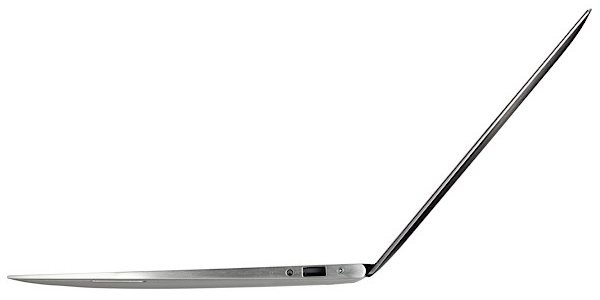Intel has unveiled design guidelines for what they claim is a new class of laptops, which will combine thinner and lighter form factors with tablet-style features such as touchscreens and near instant-on capabilities. Ultrabooks, as the company is calling them, will be less than 20mm (0.8 inch) thick and cost less than $1,000.
In a sense this is just the natural progression of the market and doesn't sound very different from the thinnest laptops available today -- not only from a design point of view but also because some already offer near instant-on capabilities using SSDs. Samsung's Series 9 notebook is just 0.64 inches thick, although priced a bit higher at $1,150, while the 11-inch version of Apple's MacBook Air is 0.68 inches at its thickest point and starts at $999.
As new chip architectures are developed and smaller manufacturing process technologies are used, laptops are bound to get more powerful and efficient, so what's Intel really bringing to the table?
Well, for one thing, by setting some guidelines for what constitute an "Ultrabook" the company can put some weight behind marketing this "emerging new breed" of laptops at a time when netbooks are no longer hot and tablets are cutting into the PC's slice of consumers' budgets. But more importantly, Intel claims their strategy is to get really thin, really responsive systems down to truly mainstream price points of around $599 in the next 18 months.

The first wave of laptops adhering to the spec will arrive in time for the 2011 holiday shopping season, with Asus, one of the initial launch partners, releasing the UX21 Ultrabook. An early sample being shown at Computex featured a unibody aluminum metal construction that's just 0.67 inch at its thickest point and weighs 2.2 pounds. It also packed an 11.6-inch 1,366x768 resolution display, a standard voltage 1.7GHz Intel Core i5-2557M processor (the MacBook Air and Samsung 9 Series use less powerful low voltage chips), 64GB or 128GB SSDs, mini-HDMI and USB 3.0.
A second wave of Ultrabooks will appear in the first half of 2012, based on Intel's upcoming Ivy Bridge processors. The company hopes to reach its goal of mainstream prices at some point in 2013 with a new Core processor design, code-named Haswell, which will half the power consumption of Intel chips compared to today's laptops, enabling thinner designs and longer battery life. By that time, Intel says, as much as 40% of laptop shipments will be in this category.
Engadget's hands-on with the Asus UX21
https://www.techspot.com/news/44015-intel-pushes-new-category-of-thin-laptops-ultrabooks.html